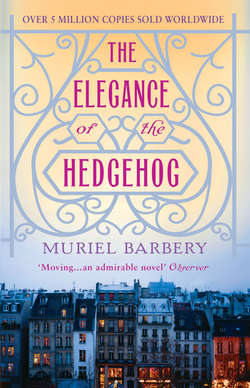Читать книгу The Elegance of the Hedgehog - Muriel Barbery - Страница 16
На сайте Литреса книга снята с продажи.
4. Refusing the Fight
ОглавлениеI have read so many books …
And yet, like most autodidacts, I am never quite sure of what I have gained from them. There are days when I feel I have been able to grasp all there is to know in one single gaze, as if invisible branches suddenly spring out of nowhere, weaving together all the disparate strands of my reading – and then suddenly the meaning escapes, the essence evaporates, and no matter how often I reread the same lines, they seem to flee ever further with each subsequent reading, and I see myself as some mad old fool who thinks her stomach is full because she’s been attentively reading the menu. Apparently this combination of ability and blindness is a symptom exclusive to the autodidact. Deprived of the steady guiding hand that any good education provides, the autodidact possesses nonetheless the gift of freedom and conciseness of thought, where official discourse would put up barriers and prohibit adventure.
This morning, as it happens, I am standing, puzzled, in the kitchen, with a little book set down before me. I am in the midst of one of those moments where the folly of my solitary undertaking takes hold of me and, on the verge of giving up, I fear I have finally found my master.
His name is Husserl, a name not often given to pets or to brands of chocolate, for the simple reason that it evokes something grave, daunting and vaguely Prussian. But that is of little consolation. I believe that my fate has taught me, better than anyone, to resist the negative influences of world thought. Let me explain: if, thus far, you have imagined that the ugliness of ageing and conciergely widowhood have made a pitiful wretch of me, resigned to the lowliness of her fate – then you are truly lacking in imagination. I have withdrawn, to be sure, and refuse to fight. But within the safety of my own mind, there is no challenge I cannot accept. I may be indigent in name, position and appearance, but in my own mind I am an unrivalled goddess.
Thus Edmund Husserl – and I have concluded that this is a name fit for vacuum-cleaner bags – has been threatening the stability of my private Mount Olympus.
‘All right, all right, all right,’ I say, taking a deep breath, ‘to every problem there is a solution, isn’t there?’ I glance at the cat, waiting for a sign of encouragement.
The ungrateful wretch does not respond. He has just devoured a monstrous slice of rillettes and, henceforth imbued with great kindliness, has colonised the armchair.
‘All right, all right, all right,’ I say again like an idiot and, puzzled, I stare at the ridiculous little book.
Cartesian Meditations – Introduction to Phenomenology. It quickly becomes clear, given both the title and the first few pages, that it is not possible to read Husserl, a phenomenological philosopher, if one has not already read Descartes and Kant. And yet one discovers with equal alacrity that even a solid mastery of Descartes and Kant will not, for all that, open the doors to transcendental phenomenology.
This is a pity. Because I have great admiration for Kant, for a number of reasons: his ideas are an admirable concentration of genius, rigour and madness, and however spartan the prose might be, I have had no difficulty in penetrating the meaning. Kantian texts are great works of literature, and I would like to prove this by demonstrating their ability to pass, with flying colours, the cherry plum test.
The cherry plum test is extraordinary for its disarming clarity. It derives its power from a universal observation: when man bites into the fruit, at last he understands. What does he understand? Everything. He understands how the human species, given only to survival, slowly matured and arrived one fine day at an intuition of pleasure, the vanity of all the artificial appetites that divert one from one’s initial aspiration towards the virtues of simple and sublime things, the pointlessness of discourse, the slow and terrible degradation of multiple worlds from which no one can escape and, in spite of all that, the wonderful sweetness of the senses when they conspire to teach mankind pleasure and the terrifying beauty of Art.
The cherry plum test is held in my kitchen. I place the fruit and the book on the Formica table, and as I pick up the former to taste it, I also start on the latter. If each resists the powerful onslaught of the other, if the cherry plum fails to make me doubt the text and if the text is unable to spoil the fruit, then I know that I am in the presence of a worthwhile and, why not say it, exceptional undertaking, for there are very few works that have not dissolved – proven both ridiculous and complacent – into the extraordinary succulence of the little golden plums.
‘I am truly up the creek,’ I say to Leo, because my skills where Kant is concerned do not amount to anything when I contemplate the abyss of phenomenology.
I am left with no alternative. I will have to enlist the help of the library and attempt to unearth an introduction to the matter at hand. Ordinarily I am very wary of such glosses or short cuts which tend to place the reader in the iron grip of scholastic thought. But the situation is far too grave for me to allow myself the indulgence of equivocation. Phenomenology is beyond my reach and that I cannot bear.
